Ramen noodles have long been a popular comfort meal, providing a warm and calming experience with each slurp. But is ramen genuinely healthy when you’re sick? Let’s explore the world of this famous comfort meal and see whether it’s a friend or foe during illness.
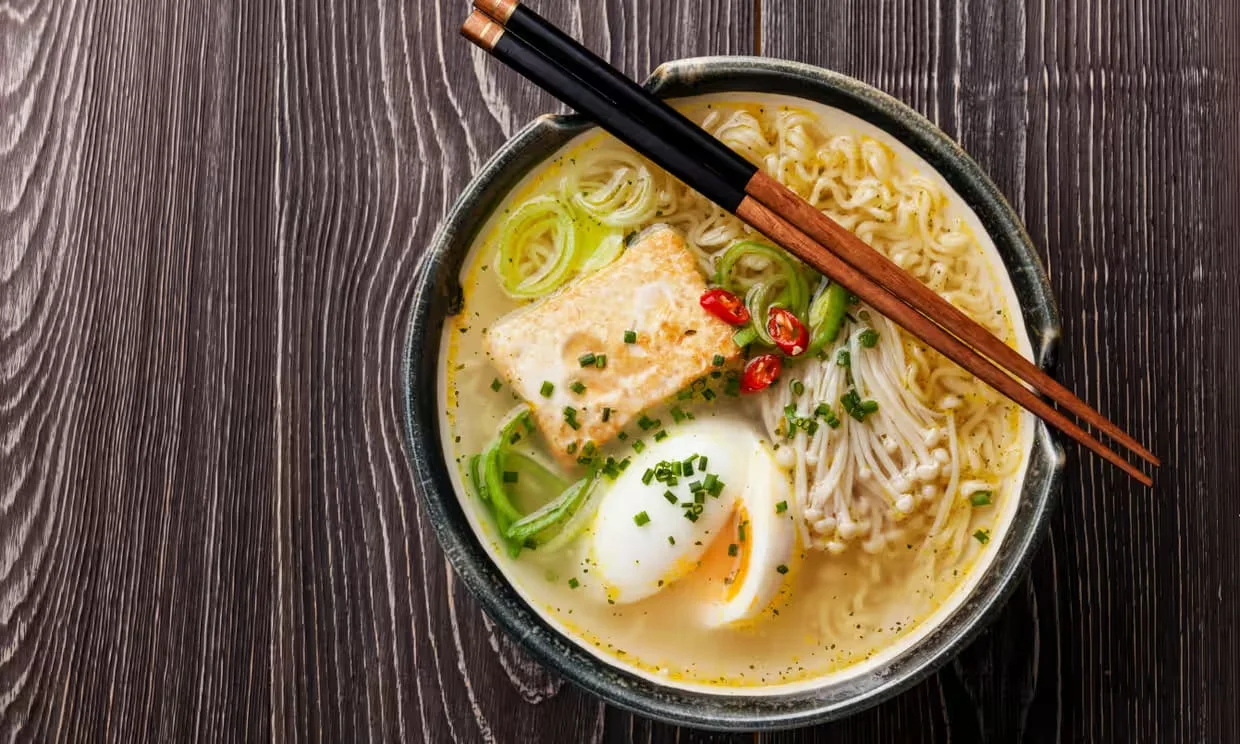
Are Ramen Noodles Healthy?
While they don’t necessarily make you healthy or unhealthy, ramen noodles don’t have much nutritional value by themselves.
Most variations include carbs, lipids, protein, and micronutrients such as B vitamins and iron. While lacking important nutrients like as vitamins, minerals, and fiber.
Objectively speaking, instant ramen noodles may not be the most nutritional alternative available.
Ramen Noodles Nutrition Facts
To give you an idea, a single serving of a popular ramen brand contains:
- Calories: 380
- Total Fat: 14g
- Saturated Fat: 7g
- Sodium: 1,590mg (66% of the recommended daily intake)
- Total Carbohydrates: 68 g
- Fiber: 2g
- Protein: 9g
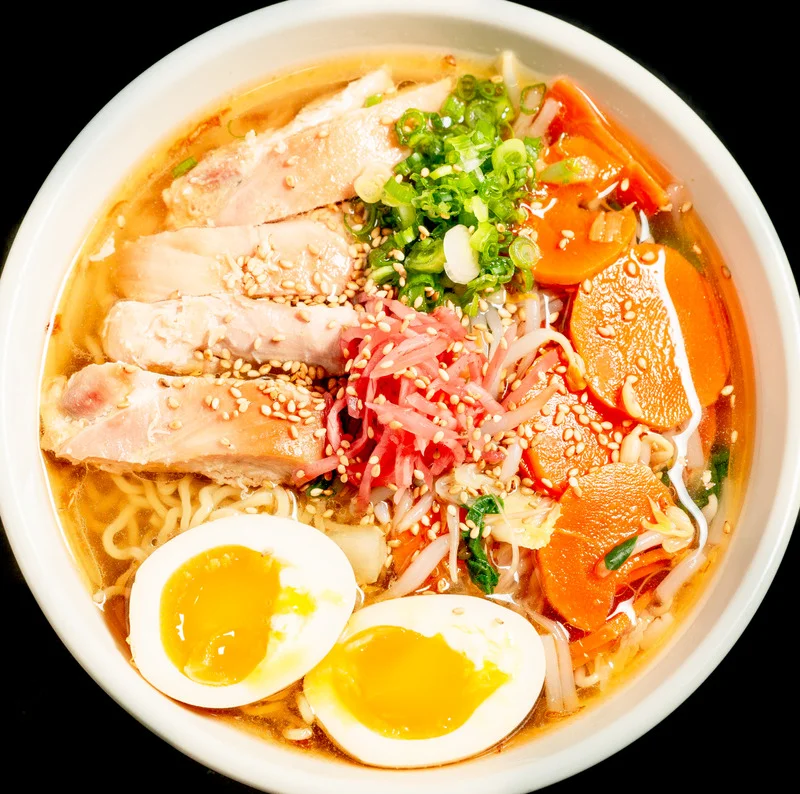
Can Ramen Provide Comfort During Sickness?
Ramen noodles may not be the healthiest choice, but there’s no disputing their ability to make you feel better when you’re sick. When you’re feeling down, the warm broth, familiar tastes, and sense of nostalgia can help you feel better.
Plus, ramen is one of a kind because it can help with colds and flu. Ginger and other healthy ingredients in the food’s sour and spicy broth help your body stay warm on cold days and boost your immune system.
Does It Offer Any Nutritional Benefits For The Sick?
Despite its image as a junk dish, ramen may provide some possible benefits when you’re sick:
- Hydration: The broth in ramen can help restore fluids lost during illness.
- Sodium: While too much sodium is harmful, a modest amount might assist restore electrolytes lost due to vomiting or diarrhea.
- Calories: Ramen can provide a calorie boost, which is especially important when your appetite is low due to illness. It can help maintain a low energy intake to aid in the body’s healing process.
- Carbohydrates: Ramen noodles contain carbs, which can supply energy to the body’s processes and aid in healing.
- Protein: Depending on the toppings, ramen might include protein-rich items like as pork, tofu, or eggs. Proteins are essential for tissue repair and immunological function.
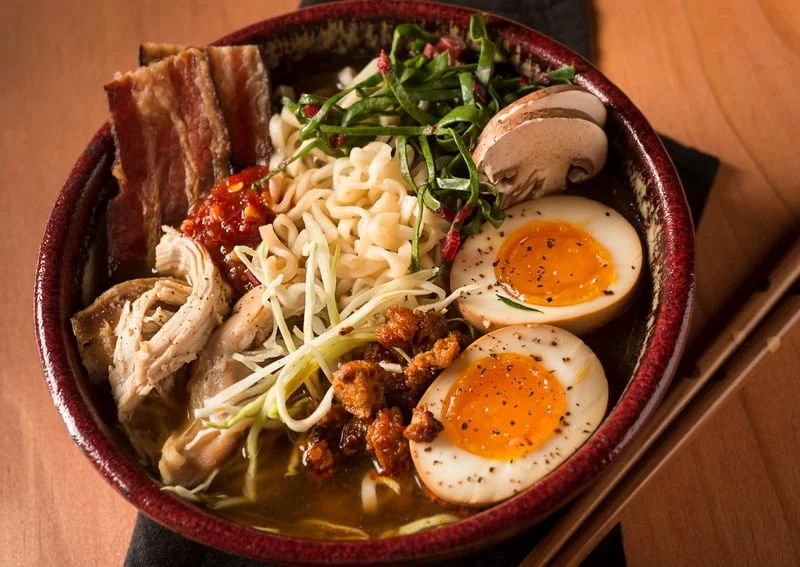
Should Certain Types Of Ramen Be Avoided When Sick?
When it comes to sickness, not all soup is the same.
Higher amounts of spice, MSG, or artificial ingredients may make symptoms like sickness, stomach upset, or dehydration worse.
Rich and fatty broths, such as tonkatsu ramen, can be heavy on the stomach and may not be suitable for people with digestive disorders.
Spicy ramen varieties may irritate the throat (Can You Eat Ramen When You Have A Sore Throat) and aggravate respiratory symptoms or heartburn.
Additionally, toppings such as fried or fatty ingredients should be addressed with caution because they might be difficult to stomach.
When you’re feeling ill, stick to uncomplicated, low-sodium options. Choosing milder broths such as miso or vegetable-based alternatives, as well as lighter, easily digestible toppings, can help sick patients have a more calming and peaceful experience.
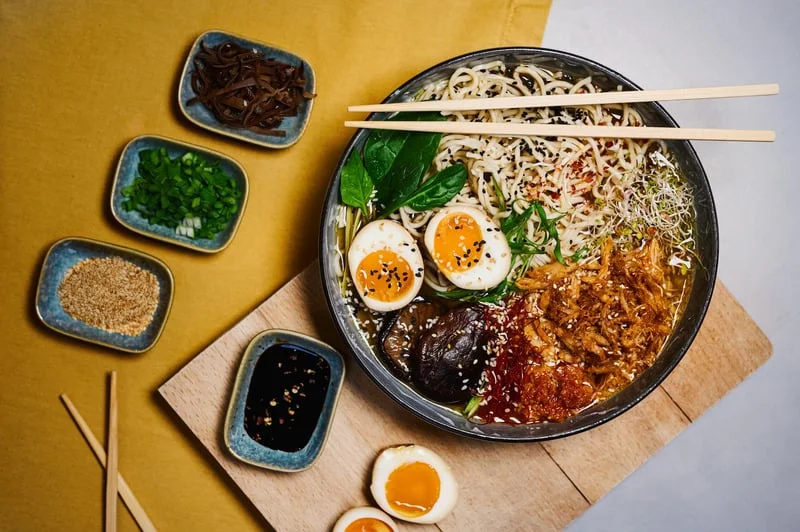
The Perceived Benefits of Ramen When Ill
Warmth and Hydration
First and foremost, ramen is a calming hot meal when you’re feeling under the weather. The steam clears your nasal passages and warms you from within. When you’re dehydrated, sucking up soup will keep you hydrated.
On days when you have a raw, sore throat, start with the contents of the seasoning packet in a cup of hot water for an electrolyte boost. When your throat is less sore, progress to the noodles.
Congestion Relief
Ramen is a decongestant powerhouse due to the combination of a hot humid bowl and salty soup. The vapors thin mucus, while the salt pushes water out to relieve stuffiness.
For added vitamin and mineral support, add mushrooms, spinach, and scallions. Garlic and ginger might also help to relieve cold symptoms.
Energy Recovery
Ramen provides an easy-to-digest source of carbohydrates and protein to replenish depleted energy levels. When you’re sick, combine it with eggs, leftover chicken, or tofu to make ramen a more full meal.
Stick to the basic flavors, as spicy variants may aggravate sore throats.
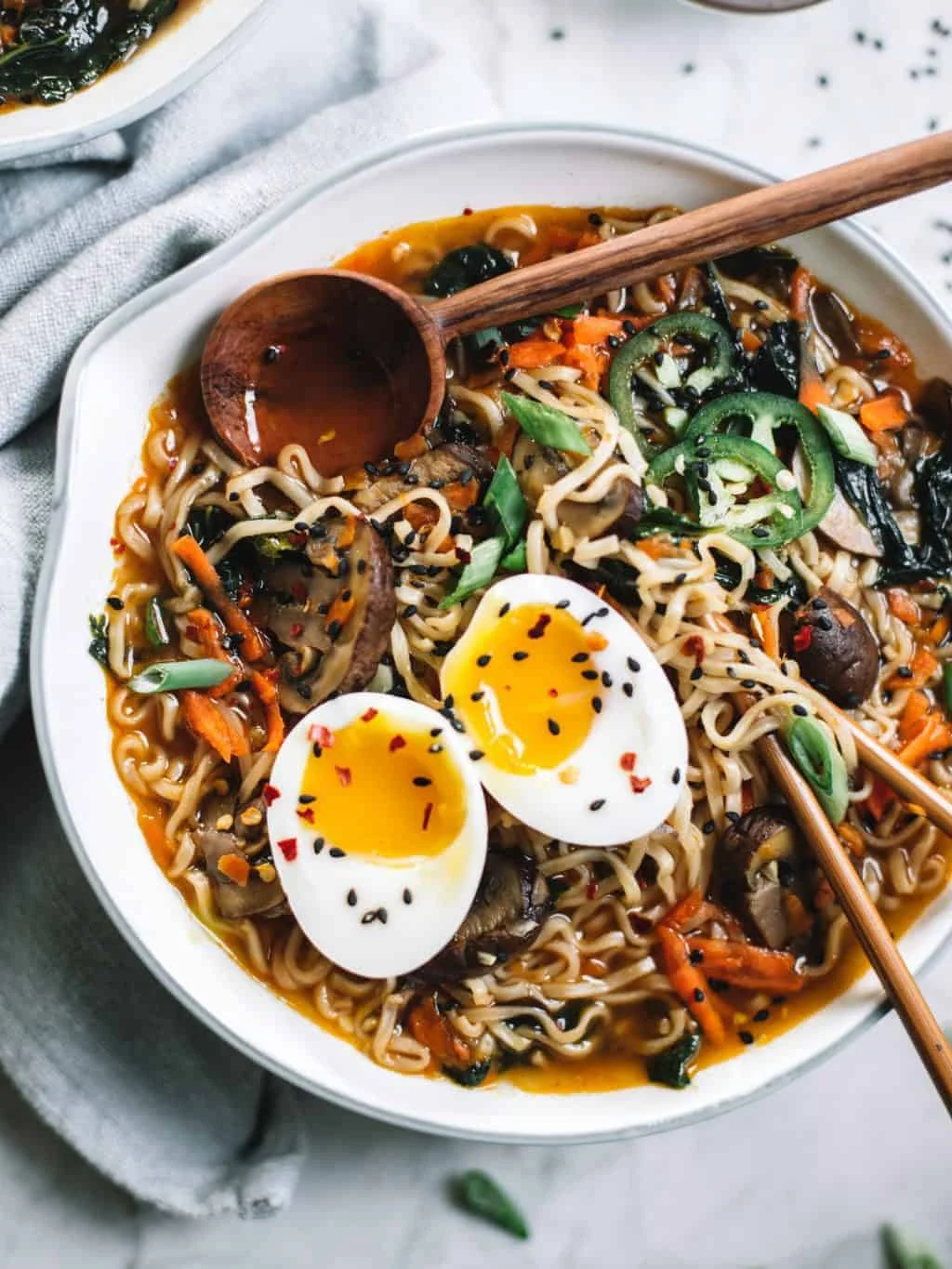
Downsides
Ramen, on the other hand, lacks important minerals required during illness, such as vitamin C and zinc. It also contains a lot of sodium, MSG, and preservatives. Furthermore, excessive use may aggravate inflammation.
When you’re ill, eat ramen in moderation alongside fruits, vegetables, and lean proteins. In addition, prioritize hydration, relaxation, and any medication prescribed by your doctor.
Are There Any Precautions To Consider?
While ramen noodles may appear to be a harmless indulgence when you’re sick, there are a few concerns to consider:
- Sodium overload: The high salt level can be problematic for people who have certain medical problems or follow a sodium-restricted diet.
- Nutrient deficiency: Ramen noodles lack vital vitamins, minerals, and fiber, all of which can help with immune function and recuperation.
- Spicy or greasy toppings: Some ramen varieties with spicy or oily toppings may not be suitable for people who suffer from digestive problems or an upset stomach.
- Preservatives and additives: Some kinds contain preservatives, artificial flavors, and other ingredients that might cause stomach problems or worsen symptoms.
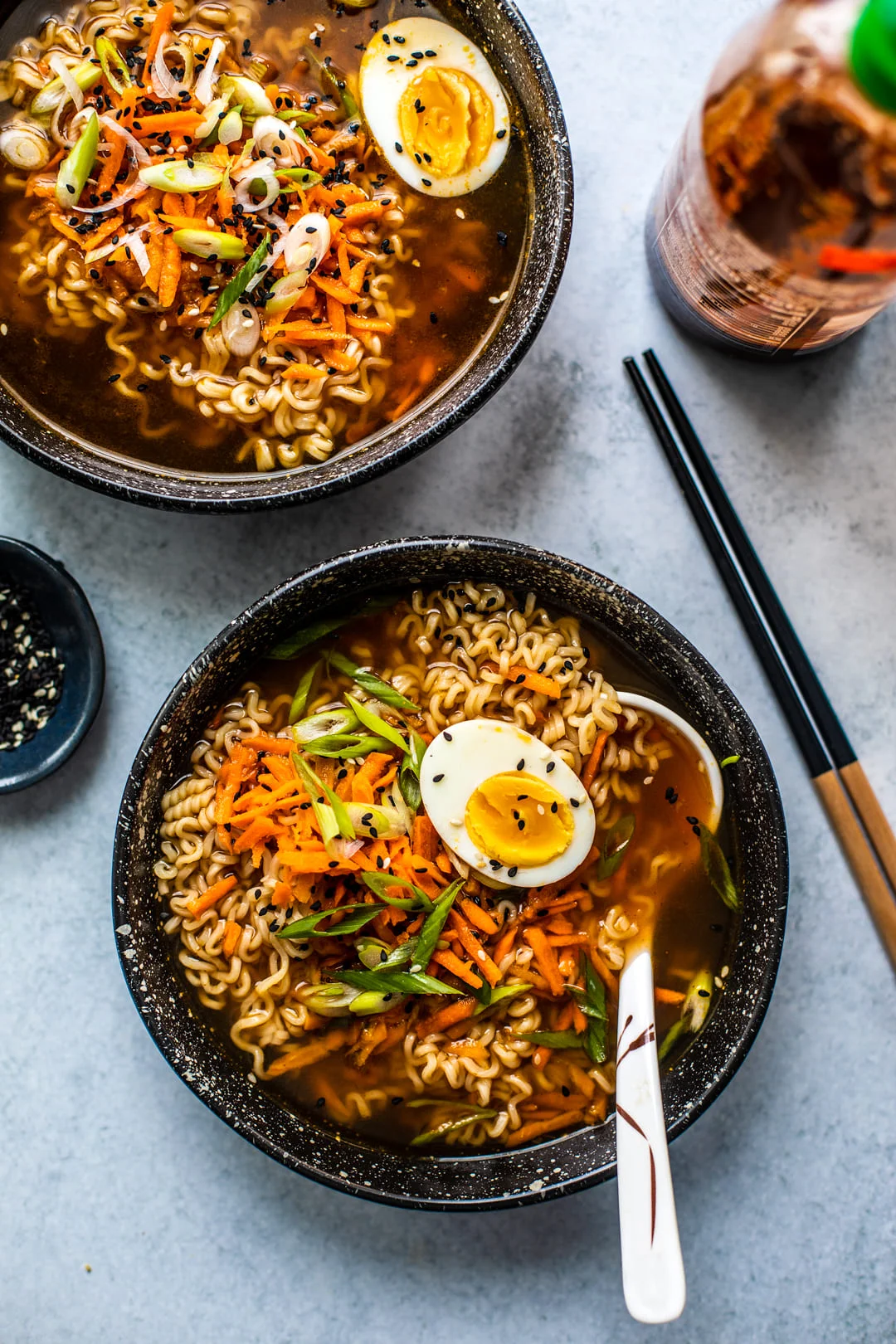
How to Make Ramen Noodles Healthier?
Add Vegetables
Toss in some fresh or cooked veggies like spinach, carrots, onions, mushrooms, or broccoli to increase the nutrient content and fiber.
Include Some Protein
Add a boiled egg, lean meat, canned beans, frozen edamame, cooked shrimp, or tofu to boost the protein and make the meal more satisfying and nutritious.
Reduce Sodium
Keep sodium-free seasonings on hand in the kitchen. To reduce sodium intake, use only half of the spice package or choose low-sodium options. Onion powder, garlic powder, sage, thyme, and other herbs make excellent ramen bowl toppings.
Make Your Own Broth and Seasoning
Skip the seasoning packet altogether and use low-sodium broth and simple seasonings like garlic, ginger, and green onions for a healthier twist.
Final Thoughts
Does ramen help when you’re sick? The clear answer is “maybe.” While it may give some comfort and hydration benefits, it’s vital to consider the potential negatives and make changes to improve its nutritional value.
If you do indulge in a bowl of ramen noodles while sick, make sure you balance it with lots of rest, fluids, and other nutrient-dense foods to help you recover.
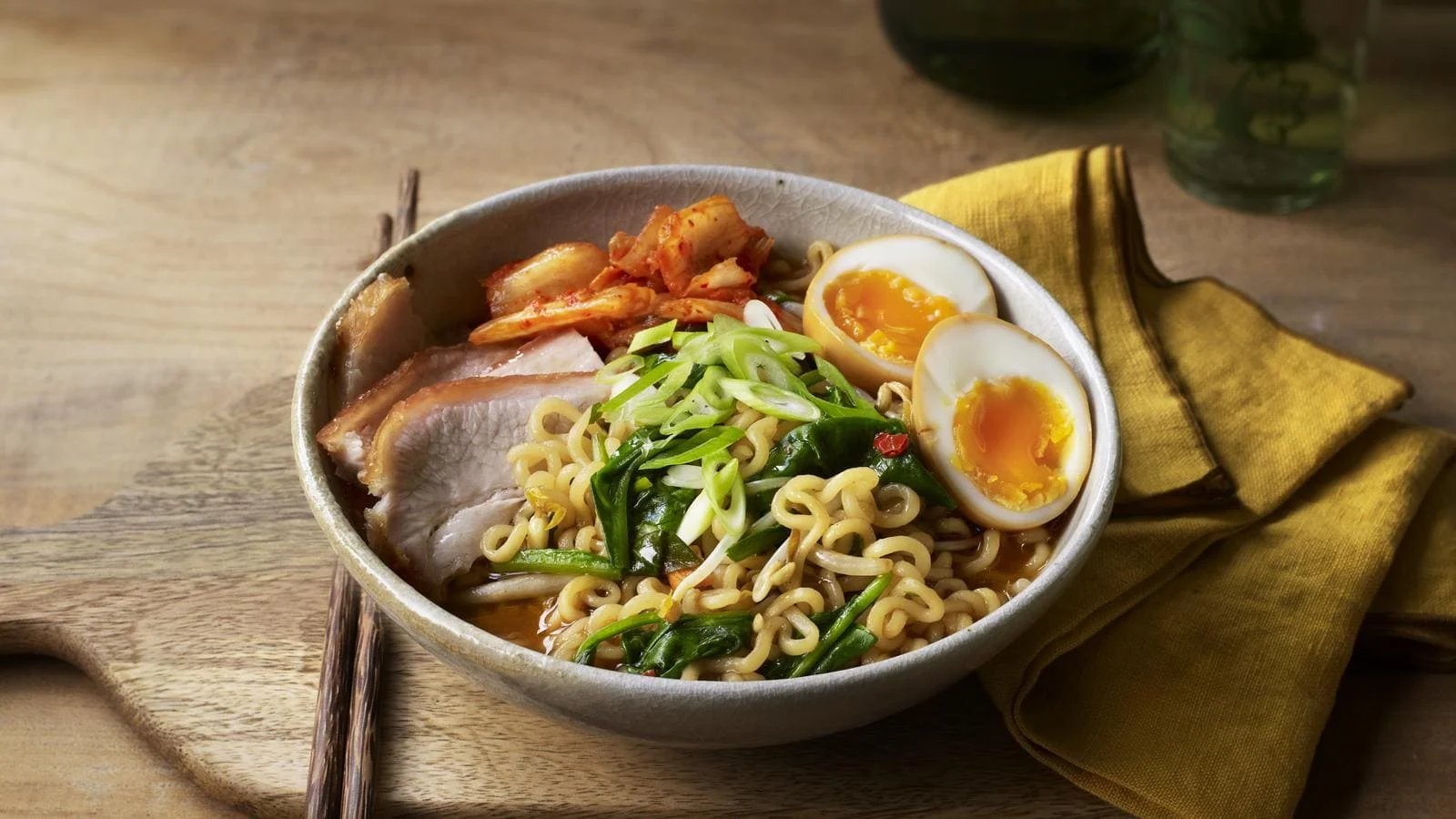
FAQs
With plenty of salt and a broth that’s easy on your stomach, instant ramen is a great remedy for any hangover. Add some protein and veggies, and you’ve got yourself a full meal with plenty of nutrients to aid your body’s recovery.
Starchy, plain foods like rice, potatoes, and noodles are good choices when you’re nauseous. They’re easy to prepare and high in calories. They also help settle your stomach.
Ramen is just noodles. If you leave off the flavor packet, and instead cook it in real chicken broth or beef broth or your favorite low-sodium broth. It’s safe to eat when you’re sick.
Chicken: The star of the dish provides protein, which also supports the immune system. Noodles are high in carbohydrates and help you feel full and satisfied. Herbs (optional): Herbs like parsley, bay leaf, thyme, or dill can boost flavor and add more antioxidants to support your immune system.
After you can tolerate drinking clear fluids, start eating smaller meals of bland, low-residual foods, such as mashed potatoes, plain noodles, crackers, toast, gelatin, bananas, rice and chicken.
Sources:
- WHAT IS RAMEN, EXACTLY?
- Is Ramen Okay To Eat When Sick? Explained (Updated)
- CAN RAMEN BE GOOD FOR YOU?
- The Best Foods & Remedies to Soothe You When You’re Sick
- Why Do We Eat Chicken Noodle Soup When We Are Sick?
- Easy Homemade Healthy Ramen Bowl
- What to Know About Ramen Noodles
- Are Ramen Noodles Bad for You? Here’s What a Dietitian Has to Say
- ramen noodles are good when you’re sick
- Use Your Cold As An Excuse To Eat These 3 Foods
- Why Ramen Is A Smart Choice When You’re Sick
- The Best Foods & Remedies to Soothe You When You’re Sick
- It hugs your soul!’ 10 dishes to get you fighting fit after an illness, from ramen noodles to spicy tom yum soup
- Best Soups for a Cold
- Sick Day Ramen (With a Turmeric Ginger Broth)
- Are The Stomach Bug Comfort Foods You’re Giving Your Kid Helping Or Hurting?
- Are Instant Ramen Noodles Bad for You, or Good?
- Why Soup Can Make You Feel Better When You’re Sick
- What to Eat When You Have COVID
- 10 dishes to get you fighting fit after an illness, from ramen noodles to spicy tom yum soup
- Is Ramen good when sick?
- Ramen Food Poisoning
- Morning Sickness: Just Ate Some Ramen Noodles and it was Heaven!!
- Is Your Ramen Ruining Your Health?
For more food tips, hacks, and advice:
- Is It Safe to Eat Raw Quinoa?
- Dealing with Moldy Butter
- The Shelf Life of Cookie Dough
- Freezing Imitation Crab to Maintain Freshness
- Maintaining Freshness of Microwave Popcorn
- Maintaining Freshness of Leftover Mashed Potatoes
- Keeping Onions and Potatoes Fresh with Smart Storage
- Can You Eat Ramen When You Have A Sore Throat